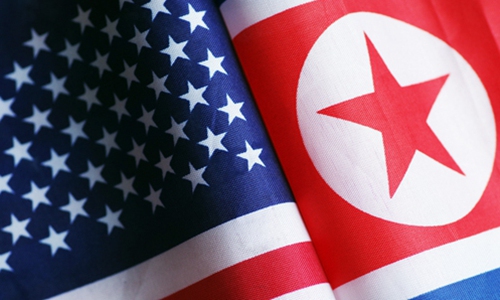HOME >> OPINION
Relaxing NK sanctions also benefits US
Source:Global Times Published: 2019/12/18 21:03:40

Photo: IC
China and Russia on Monday proposed to the UN Security Council that some sanctions be lifted on North Korea, with the US quickly opposing the proposal. We don't think Washington should oppose out of instinct the goodwill draft of Beijing and Moscow. It should carefully review the ups and downs of the Korean Peninsula situation in the past few years, and take more pragmatic and effective measures to constantly inject impetus to the denuclearization of the peninsula.North Korea has expressed its dissatisfaction with US lip-service. Pyongyang stopped negotiating with Washington and conducted missile tests that didn't violate the UN Security Council resolution but sent a warning to Washington. Pyongyang also requested Washington to come up with an acceptable offer, otherwise, North Korea will take a "new path."
Washington definitely holds the strategic initiative of the US-North Korea negotiating process. The US has put very high demands on North Korea, and the US strategy is it will not ease sanctions as long as North Korea does not meet the standards. Time is obviously on the US side if such a stalemate goes on. But North Korea will not accept the stalemate.
The US relies too much on sanctions. But anyone familiar with international politics history knows that sanctions are not effective for every target. A stick can be a deterrent only when it goes with a carrot. The US problem is that it still lifts the stick when it should carry out the carrot.
It has been more than two years since North Korea suspended its nuclear tests and intermediate-range ballistic missile tests. North Korea has also promised not to launch these tests in the future.
The international community should relax sanctions on North Korea in a way, which will increase Pyongyang's confidence in the denuclearization process and strengthen US-North Korea mutual trust. This is obviously beneficial to maintain the momentum of the negotiations and achieve practical results.
It is not wise to impose sanctions but never lift any of them. The sanctions on North Korea remain unchanged for a long time, and have thus lost the function of promoting denuclearization. It is naïve to believe Pyongyang would ultimately abandon nuclear projects as it cannot withstand the sanctions. The reality is Pyongyang has fought back against sanctions rather than surrendered under the pressure - which does not follow the US script.
The Korean Peninsula's ability to adapt to the situation is much weaker than North Korea's ability to adapt to the sanctions. The situation on the peninsula is not only about Washington and Pyongyang. There are many other stakeholders. If North Korea takes a new path, there will be a chain reaction in the regional situation. It will test Washington's endurance, and South Korea's reaction will first become a realistic issue.
No one in the region wants a repeat of the tense confrontation in 2017. The confrontation does not benefit Washington as well because it will completely change the momentum of the previous summits between North Korean leader Kim Jong-un and US President Donald Trump. People still remember many of Trump's enthusiastic statements. If Trump reverts to a fierce attitude toward North Korea, it will seem ridiculous and his political opponents may take advantage of him in the presidential election.
Due to its political atmosphere, the US is unlikely to proactively lift sanctions on North Korea. Hence, it should at least not geopolitically distort the goodwill draft of China and Russia. Beijing and Moscow hope the Korean Peninsula could restore lasting peace and stability rather than embarrass Washington with the issue.
Sanctions are not almighty. Flexibly putting and lifting sanctions is in line with the real meaning of sanctions. It is regrettable to see Washington tightly holding on to sanctions.
Posted in: EDITORIAL